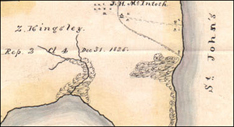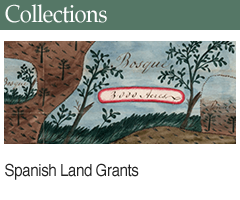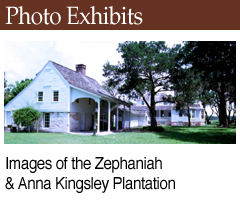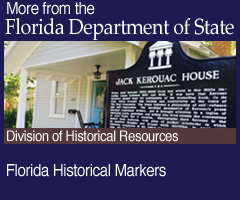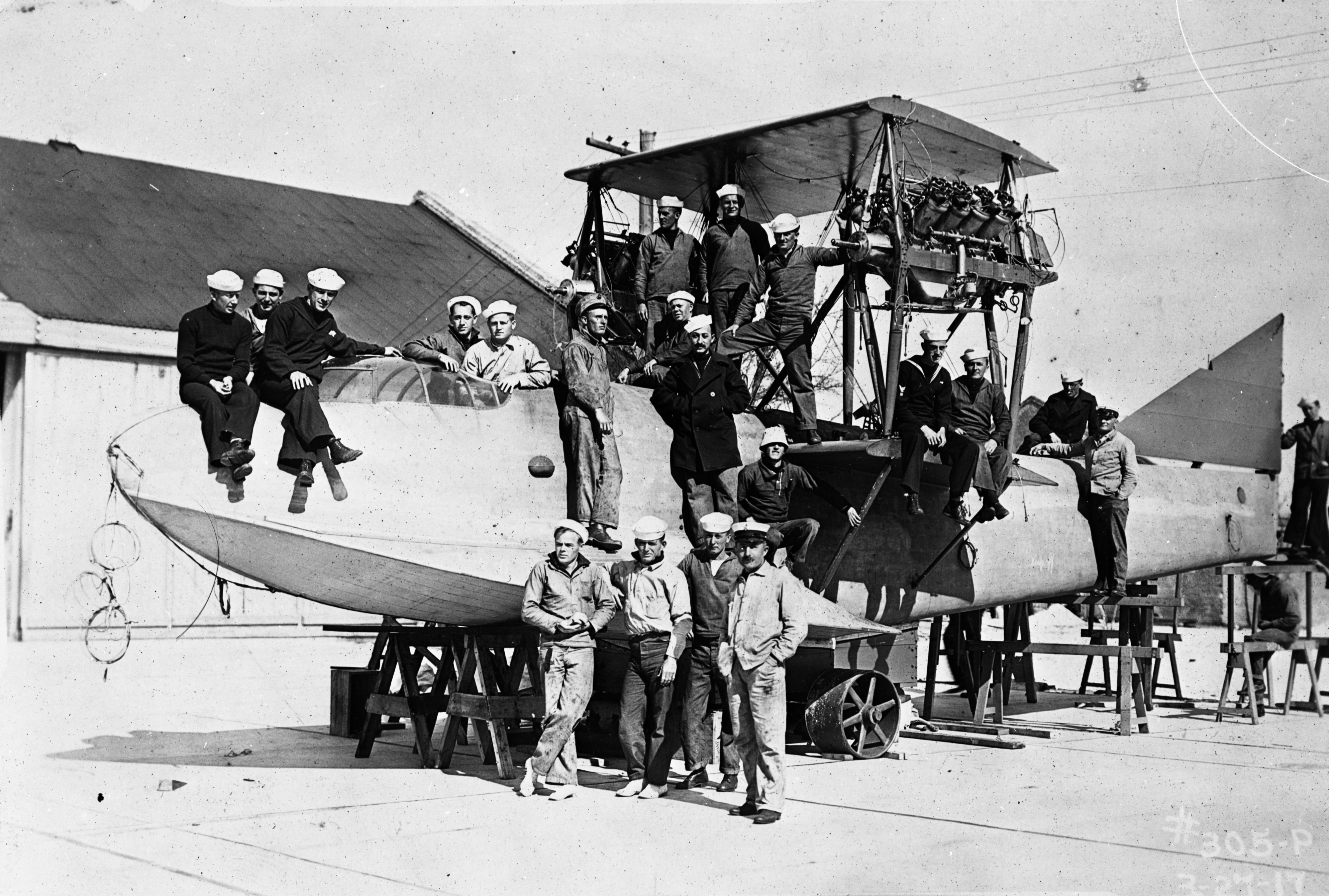Kingsley Papers
Papers Concerning the Will of Zephaniah Kingsley
-
Will of Zephaniah Kingsley »
A handwritten copy of the will of Zephaniah Kingsley from the 1886 Supreme Court case files. -
Petition to the will of Zephaniah Kingsley »
The petition to the will made by Kingsley's sister Martha McNeill. -
Executors' response to the petition of Anna M. J. Kingsley »
The executors' response (Benjamin A. Putnam and Kingsley B. Gibbs) to the petition of Anna M. J. Kingsley, widow of Zephaniah Kingsley.
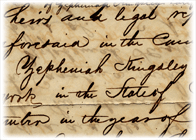
The Collection
This collection contains a handwritten copy of the will of Zephaniah Kingsley from the 1886 Supreme Court case files and two documents concerning the contesting of Zephaniah Kingsley's will.
One document is the petition to the will made by Kingsley's sister Martha McNeill while the other document is the executors' response (Benjamin A. Putnam and Kingsley B. Gibbs) to the petition of Anna M. J. Kingsley, widow of Zephaniah Kingsley.
Kingsley was a wealthy planter and slave owner in Northeast Florida. His heirs included his wife, an African-American named Anna M. J. Kingsley, and their children. While incomplete and inconclusive, these documents reveal the precarious and dynamic status of free blacks in antebellum Florida.
Background
Zephaniah Kingsley was both a defender of slavery (albeit the system practiced under Spanish rule) as well as an aggressive activist for the legal rights of free blacks.
Born in Bristol, England in 1765, Kingsley moved to Charleston, South Carolina, which was then a British colony, in 1770. By the 1790s, Zephaniah was active in maritime commerce, including slave trading. He spent time in London, Denmark, and Charleston. In 1803, Kingsley became a citizen of Spanish Florida and began purchasing land in Northeast Florida. He owned four plantations by 1811.
In Havana, Cuba in 1806, Kingsley purchased a teenager from the Jolof region of Senegal in West Africa named Anta Majigeen Ndiaye, whom he then freed and made his wife: Anna Kingsley.
When the United States assumed control of Florida from Spain in 1821, it agreed to honor the rights of the territory's free blacks. Over the next three decades, however, state and local laws and customs slowly eroded the rights of these U.S. citizens. By the 1840s and 1850s, many free blacks, including many who were born free, were forced into slavery.
By the end of his life, Zephaniah was embittered by the racial discrimination practiced in Florida's antebellum society and became concerned over the fate of his wife and children.
The Will
Through the terms of his will, Kingsley sought to ensure the freedom and financial well-being of the children he had by various women (slave and free) as well as his wife, Anna. In 1835, fearing for the safety of his wife and children in Florida, Kingsley made preparations to send his family to Haiti. By 1838, Anna and her children were Haitian residents.
In the will, he recommended to his executors that the slave families he owned not be separated without their consent, that his slaves be given the privilege of buying their freedom at one half their value, and that they be given ample opportunity to go to Haiti if they could not remain free in Florida.
Kingsley enjoined his "natural and colored children" to keep a legally executed will at all times in order to direct the disposal of their goods in the event of death, "until they remove themselves and properties to some land of liberty and equal rights, where the conditions of society are governed by some law less absurd than that of color. " Ultimately, Kingsley's will was upheld, but the estate was considerably depleted in the meantime by poor administration.
Petition Contesting the Will
Following Kingsley's death in 1843, many of his relatives contested the legality of the will. One such petition was filed on November 30, 1844. Kingsley was infamous within Florida's antebellum society for many reasons, most notably for his marriage to African-born Anna Madgigene Jai. In his attempt to provide for his dependents, several of whom were people of color, Kingsley flouted the racial norms of his day. His behavior brought on bitter complaints from relatives, who challenged the will when it was probated in Jacksonville.
Among the petitioners to the will was Anna McNeill Whistler, Martha McNeill's daughter. Anna McNeill Whistler was the mother of the artist James Abbott McNeill Whistler and subject of his famous portrait.
Executor's Response to the Petition
Executors of the will were Kingsley B. Gibbs, George Kingsley, and Benjamin A. Putnam. Their response to the petition by Kingsley's family, on behalf of Anna Kingsley, was dated September 5, 1846. As a consequence, Kingsley's wives and children were slow to receive their shares of the estate.
Anna Jai Kingsley persisted in her demands to secure her share and those of her children, returning in 1846 to Duval County from Haiti in order to eliminate the tremendous problem of distance. In 1847, she finally received $2,000.00 from Gibbs and Putnam under order of the Duval County probate court.
Spanish Land Grants
Zephaniah and Anna Kingsley owned a great deal of land in Northeast Florida, including Fort George Island (their primary plantation, which today is both a Florida State Park and a National Historic Site) at the mouth of the St. Johns River, Laurel Grove Plantation (in modern-day Orange Park, Florida), Mandarin Plantation (Anna's plantation in Jacksonville), the Ashley and San Jose plantations (both in south Jacksonville), and White Oak Plantation (on the St. Mary's River).
During the time that the Kingsleys owned this land, ownership of Florida changed hands from Spain to the United States. The Spanish Land Grant Collection contains over six hundred pages of maps, surveys, and letters documenting ownership of land by both Anna and Zephaniah Kingsley.
Photographs and Images
The exhibit, Images of the Zephaniah and Anna Kingsley Plantation includes both historic and recent images of the Kingsley plantation from drawings of the Kingsley mansion in 1878 to the photograph of this restored tabby cabin.
Other Collections
There is neither a complete Zephaniah Kingsley nor an Anna Kingsley manuscript collection. The above legal documents, along with the Spanish Land Grants, are the sole records the State Archives of Florida has for Anna and Zephaniah Kingsley.
The few other records concerning Kingsley that survive are scattered across many archives and private collections including the Duval County Courthouse, the East Florida Papers and other related collections at the P.K. Yonge Library of Florida History (University of Florida), the St. Augustine Historical Society Research Library, and St. Johns County Courthouse (St. Augustine, Florida).
Bibliography
May, Philip S. "Zephaniah Kingsley: Non-Conformist, 1765-1843," Florida Historical Quarterly 23 (January 1945): 145-159.
Schafer, Daniel "A class of People neither Freemen nor Slaves: From Spanish to American Race Relations in Florida, 1821-1861," Journal of Social History 26 (1993): 587-609.
___________ Anna Kingsley [Revised] St. Augustine, Fla.: St. Augustine Historical Society, 1997.
____________ Anna Madgignine Jai Kingsley: African Princess, Florida Slave, Plantation Slaveowner Gainesville, Fla.: University Press of Florida, 2003.
Stowell, Daniel W. Balancing Evils Judiciously: The Proslavery Writings of Zephaniah Kingsley Gainesville, Fla.: University Press of Florida, 2000. [Also contains a reprint of Zephaniah Kingsley's will.]
Tilford, Kathy. Anna Kingsley: A Free Woman OAH Magazine of History 12 (Fall 1997).

 Listen: The Gospel Program
Listen: The Gospel Program